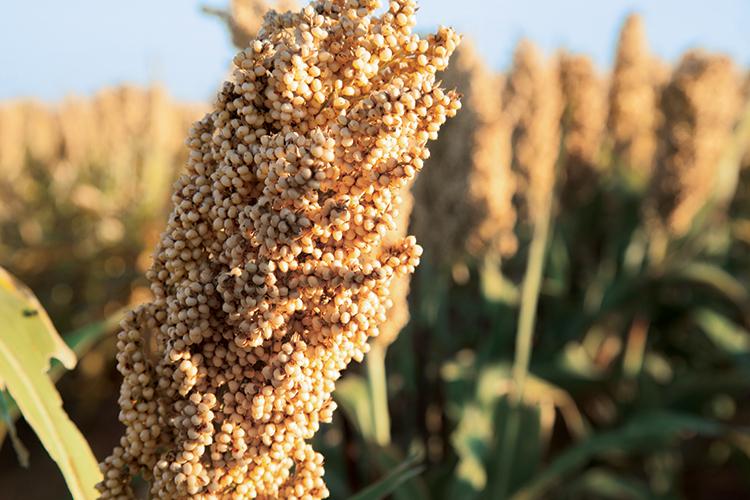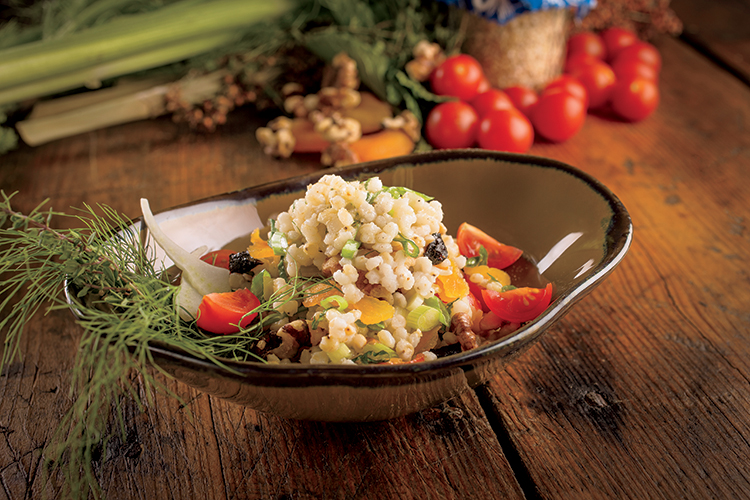Home > Arkansas > Arkansas Crops & Livestock > White Sorghum is the Other Grain in Arkansas
White Sorghum is the Other Grain in Arkansas

Rice, corn and wheat hold their own as staple crops in Arkansas agriculture, but there’s a new player in the world of grains – sorghum.
“Currently, sorghum is an important export crop in Arkansas,” says Chef William Ginocchio, a certified executive chef and member of the culinary faculty at Pulaski Technical College’s Culinary Arts and Hospitality Management Institute (CAHMI) in Little Rock. “Unfortunately, consumers in Arkansas are still unfamiliar with sorghum as a food crop, and we hope to correct that.”

Support For Sorghum
Stewart Weaver, a sorghum farmer in the northeast town of Edmonson, has been growing the grain since the mid 1990s, and serves as a board member for the Arkansas Corn and Grain Sorghum Board.
“Sorghum is a non-GMO crop that can be used in many different ways,” Weaver says. “Regular red sorghum is mostly used for feed and then there’s white food-grade sorghum for people who have Celiac disease. You can make a flour out of it or pop it like popcorn.”
In 2014, CAHMI obtained a grant from the Corn and Grain Sorghum Board to fund a program at the school promoting sorghum as a food product. The funds were to be used to develop recipes featuring sorghum as a key ingredient. Ginocchio currently serves as the lead culinary investigator for the grant. He is working on gluten-free recipes along with recipes that use sorghum in a more traditional way, such as in breads, promoting sorghum to local distillers and small businesses, demonstrating the product at festivals and events, and creating marketing materials, such as brochures and websites on sorghum to educate consumers. They also are working toward producing a sorghum beer at CAHMI. Other team members include Ken Lipsmeyer and Dr. Meenakshi Budhraja, both CAHMI faculty members, as well.
“We hope to have enough recipes compiled to create a calendar featuring a different sorghum recipe for each month, then perhaps a cookbook later,” Ginocchio says.

More Than Gluten-Free
Initially, sorghum’s appeal to consumers began to grow with the gluten-free movement and rise in Celiac disease, but the crop has many other benefits. About 165,000 acres were harvested in Arkansas in 2014, and 2015 acres increased by 160 percent to 430,000 harvested acres, according to Ginocchio. This is in part because sorghum is a hardier, easier-to-grow crop than some others, including corn.
“Sorghum requires much less water and pesticides to flourish,” Ginocchio says. “So while a farmer can sell corn for a higher price, the reduced production cost for sorghum can make growing it competitive. The key to making sorghum more attractive will be in creating culinary markets for it.”
Weaver says that the program is beneficial in building niche markets for food-grade sorghum. “It has a lot to do with demand,” he says. “The demand for grain sorghum gives farmers more niche markets to appeal to.”
Sorghum is gluten free, so it can be easily substituted in recipes for people suffering from Celiac disease, and it also boasts nutritional benefits, with high levels of antioxidants.
“It’s different, so no one is bored with it yet,” Ginocchio adds.
To further promote the grain, Ginocchio and other program members are working with national grocery stores, such as Whole Foods and Kroger, to encourage them to carry whole grain sorghum. Many stores already carry sorghum flour, but not the whole grain, which can be used similarly to rice, corn or any other grain.
“We’re pursuing this because it really won’t accomplish much to create an interest in sorghum with consumers if they don’t have a ready means to purchase it,” Ginocchio says.
Along with making sorghum more accessible, Ginocchio says the group will continue to look at promoting the grain from multiple directions in the future. He hopes that with enough recipes, the calendar will become an annual endeavor, and the program will continue with education through classes and demonstrations. He also says while nothing is finalized, the idea of a Sorghum Festival is another concept they hope to make a reality.





[…] Culinary Arts and Hospitality Management Institute (CAHMI) in Little Rock. “Unfortunately, consumers in Arkansas are still unfamiliar with sorghum as a food crop, and we hope to correct […]
How can the small garden/hobby grower get these seeds for growing? Will they do well in zone 7 in the Cumberland Plateau? Thx.